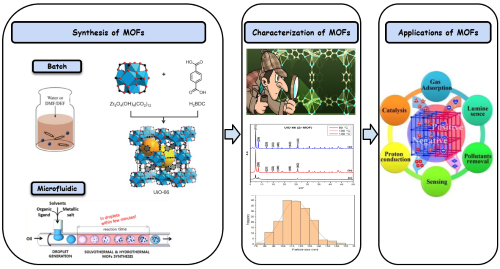Synthesis of MOF
Last Updated:
- English
- Türkçe
Synthesis of MOF
Metal-Organic Frameworks (MOFs) are a new type of hybrid crystalline molecular frameworks which comprise of inorganic metal-centered secondary building units (SBUs) linked by organic linkers resulting in 1-D, 2-D, and 3-D molecular networks. By choosing different SBUs and organic linkers nearly infinite number of structural networks of MOFs can be designed. Due to their remarkable design flexibility, ultra-high porosity, large specific surface area and tunable properties, MOFs are indispensable for potential applications in clean energy, fuel cells, gas adsorption, and catalysis.
In our lab we are synthesizing three types of MOFs, UiO-66, MIL-47, and MIL-125, which are zirconium, vanadium and titanium metal-based MOFs, respectively. MOFs are synthesized in our lab following two routes i.e. conventional solvothermal and microfluidic. Solvothermal synthesis is the method of choice for producing MOFs in research laboratories around the world but it is a time-consuming method. So, microfluidic route is also employed to synthesized MOFs as it is a fast method. In microfluidic systems, nanolitre or picolitre droplets of reactants can be produced having a high surface area to volume ratio, and which, as it moves along the micro-channel, acts as a microreactor providing ideal conditions for high reaction rates and fast crystallization. The quality of MOFs produced from both processes (solvothermal and microfluidic) will be compared by analyzing properties of these MOFs using different state-of -the-art characterization techniques to see which route gives the best product.
The Microfluidic synthesis of MOFs is carried out in collaboration with Associate Prof: Dr Selis Onel's research lab in chemical engineering department at Hacettepe University, Ankara. The project, Synthesis of MOFs, is a funded TUBITAK (Scientific and Technological Research Council of Turkey) 1001 Project (220M002).

